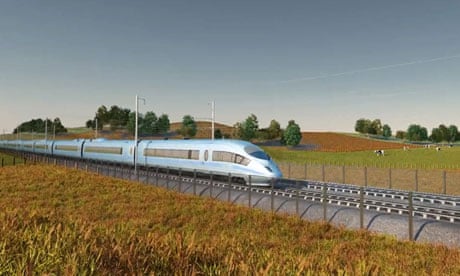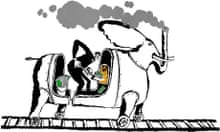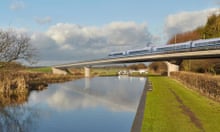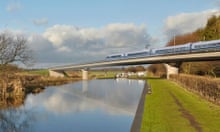Britain does not believe in investment – as is painfully obvious in both the private and public sectors. British-owned companies have a baleful record on investment and innovation. Public sector investment is no better, where all big projects since the second world war – from the Channel tunnel to the M25 and London's east-west Crossrail – have been bitterly opposed by the Treasury before finally going ahead. In a short–termist culture only costs are certain, but evaluating benefits is made even harder by multiple institutional and methodological obstacles.
So it is with HS2. The costs are certain, and easy to inflate, as recently both the Institute of Economic Affairs and the Treasury have done in a leak to the Financial Times, conflating everything they possibly could. The IEA's position is understandable – it even includes the cost of a potential north-south Crossrail in its figures, which is a discrete project from HS2. But as it openly acknowledges, the only rail investment it could support is that which pays for itself with no public subsidy – in other words, none at all. In an IEA universe we would forego mobility unless via privately funded toll roads.
However, the game the Treasury is playing, in leaking that the project could cost £30bn more than the current estimate while minimising any benefits, is much more dangerous. Sir Nicholas Macpherson, permanent secretary to the Treasury since 2005, was one of Crossrail's most vigorous opponents and bitterly regrets that he was unable to stop the project despite its obvious benefits in enlarging London's transport capacity.
He is determined to fight HS2 to the last. Any "senior Treasury official" – the source of the FT leak – will have known of their boss's position; indeed I doubt such a high-profile and damaging leak could have been made without his knowledge and tacit approval, fuelled by his near desperation that the chancellor and prime minister seem determined to drive the project forward despite his best efforts at proving it costly and futile. No official should leak against his or her own minister, whatever their private views, and if the chancellor chooses to launch an inquiry into the leak I would expect Sir Nicholas's resignation.
The current estimated cost of £42.6bn includes a generous £14.2bn for contingencies on top of already much checked estimates for the special tunnelling to make the scheme environmentally and politically acceptable, especially in the most controversial part of the route – from London to Birmingham. In this respect the project is analogous to the Olympic Games, where a large contingency allowed the spending eventually to be under-budget.
In any case, the spending is also going to be spread over 15 years or more. Britain has spent an estimated £40bn on fighting the war in Afghanistan over a dozen years without turning a hair. I recollect none of the newly enlisted opponents to HS2 on the Labour side – from Lord Mandelson to Alistair Darling – voicing public concerns over that expenditure, which has yielded no gains whatsoever. The British will fund wars, but not our infrastructure. It's time to turn the page. At least with HS2 we will have something valuable to show for our efforts.
The refuseniks also wholly undervalue two crucial dimensions to the case. First, Britain's rail network is bulging at the seams: the country needs new capacity and the cost of bodged piecemeal enlargements to the existing network are cruelly expensive and yield minimal benefits compared to HS2, as former transport minister Lord Adonis argues. The second is about ambition – about what kind of country we want to be. High-speed rail will bring Britain together: the ripple and cascade effects will be enormous, attracting investment into the Midlands, the north and Scotland and transforming the country's relationships.
Above all HS2 is a statement about ourselves and our belief in our future. On this Mr Cameron and Mr Osborne are right – as is Mr Miliband in his continued support. The centre must hold. Britain has made too many disastrous deferments and cancellations of crucial investment projects over the decades. HS2 should not join their ranks.








